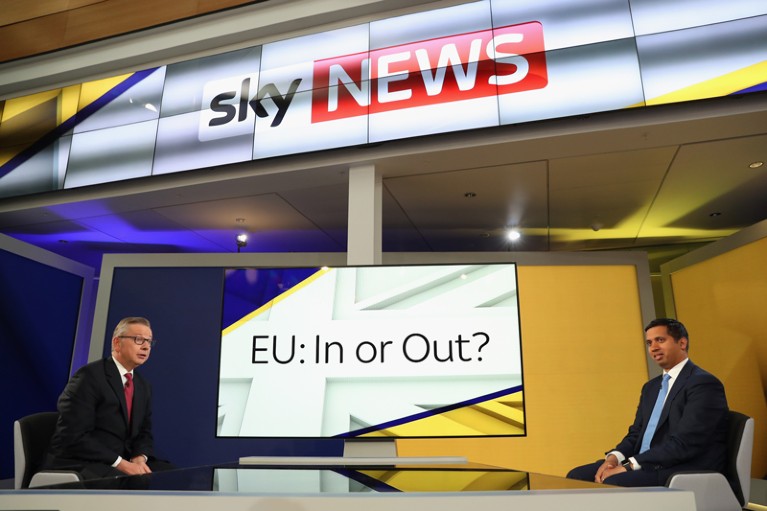
In the run-up to the Brexit referendum in 2016, then UK justice secretary Michael Gove (left) famously told Faisal Islam at Sky News that people had had enough of experts.Credit: Dan Kitwood/Getty
The United Kingdom’s departure from the European Union is not only a tragedy for its people, but also an existential shock for the EU. The EU is as much an idea as an economic and political union. It has been a global symbol of how enemies can become friends and partners in prosperity. It is also remarkable for the value it places on science and expertise, which are at the heart of its commitment to the rule of law, representative democracy, free trade and free movement of people.
Researchers are integrated into EU decision-making to help to ensure that policy is informed by a consensus of evidence, a system sometimes called technocratic governance. The EU itself also supports the world’s largest regional research fund — the 85-billion (US$100-billion) Horizon Europe programme. That the United Kingdom, formerly one of the EU’s biggest economies, has chosen to reject an institution that values evidence and science so highly is of huge significance.
As the clock ticks towards 31 December, after which the United Kingdom will no longer be required to align itself with EU rules, the EU’s researchers must study the anti-expert narrative that contributed to Brexit, and its potential to be used in the union’s 27 remaining member countries to undermine evidence and the rule of law.
UK and EU: Cherish what you have achieved and stay close
EU policymakers contend that the United Kingdom is an outlier, and that Brexit will not affect the remaining 27 member states. The United Kingdom, according to this view, was never a fully aligned EU country. It was not among the founding nations. It chose to stay out of the Eurozone. Had UK governments been more committed to the EU, why would they have chosen to give citizens the option of leaving — first in 1975, and again in 2016? Such arguments are not incorrect, but, at the same time, some of the forces that shaped Brexit do not apply only to the United Kingdom.
For example, Johan Schot, a historian of science and technology policy at Utrecht University in the Netherlands and co-author of Writing the Rules for Europe (2018), a history of how expert knowledge helped to create the EU, says some EU citizens have become dissatisfied with technocratic governance. There’s also a perception that when decisions are made only on the basis of expert evidence, people aren’t in control of their own choices, adds Kalypso Nicolaidis, an international-relations researcher at the University of Oxford, UK. Both Nicolaidis — author of Exodus, Reckoning, Sacrifice (2019), a book on the lessons that the United Kingdom and the EU can learn from Brexit — and Schot say that EU leaders must find more participatory methods of governance, so that citizens are reassured that they have more of a voice in the decisions made on their behalf.
This advice should be heeded. Brexit’s architects implicitly targeted the research community when they categorized researchers as ‘experts’ and separate from ‘the people’. So, whereas in 2016 the United Kingdom’s researchers — who were among the leaders and supporters of the Remain campaign — argued, among other things, that Brexit’s uncertainty would harm the country, the Leave campaign responded by seeking to divide researchers from the rest of society. Pro-Brexit minister Michael Gove famously remarked that the British people “have had enough of experts”, which included research organizations. It was an extraordinary thing to say, but it spoke to the campaign’s overall narrative that ‘the people’ would be better off if the United Kingdom left the EU — in contrast to those who benefit from the free movement of people and from EU funding.
Brexit’s back: the five issues that will shape science
As populist parties prepare for elections in Germany next year and in France in 2022, they might decide to adopt this narrative, given its apparent success in the United Kingdom. Even in countries where such parties do not fare well, they have been able to influence mainstream parties to adopt some of their ideas and policies. And it will not be lost on some mainstream parties that dividing experts from the broader population could be a part of a winning formula.
Researchers will always be essential to the EU. Horizon Europe, too, will be central to the global challenges that the world faces — from COVID-19 to climate change. And the projects it funds might yet benefit from the involvement of UK researchers, albeit as associate members.
But although Brexit itself is likely to be an isolated event, the tactics used to achieve it aren’t. There are lessons here not only for the EU’s leaders, but also for researchers, who should seek to understand how their work was used in an anti-expert narrative. And the EU must beware the risks of such narratives spreading, because, should they do so, that could have far-reaching consequences.

 UK and EU: Cherish what you have achieved and stay close
UK and EU: Cherish what you have achieved and stay close
 Brexit’s back: the five issues that will shape science
Brexit’s back: the five issues that will shape science
 Brexit is happening: what does it mean for science?
Brexit is happening: what does it mean for science?
 How Brexit threatens Irish science’s cross-border collaboration
How Brexit threatens Irish science’s cross-border collaboration



